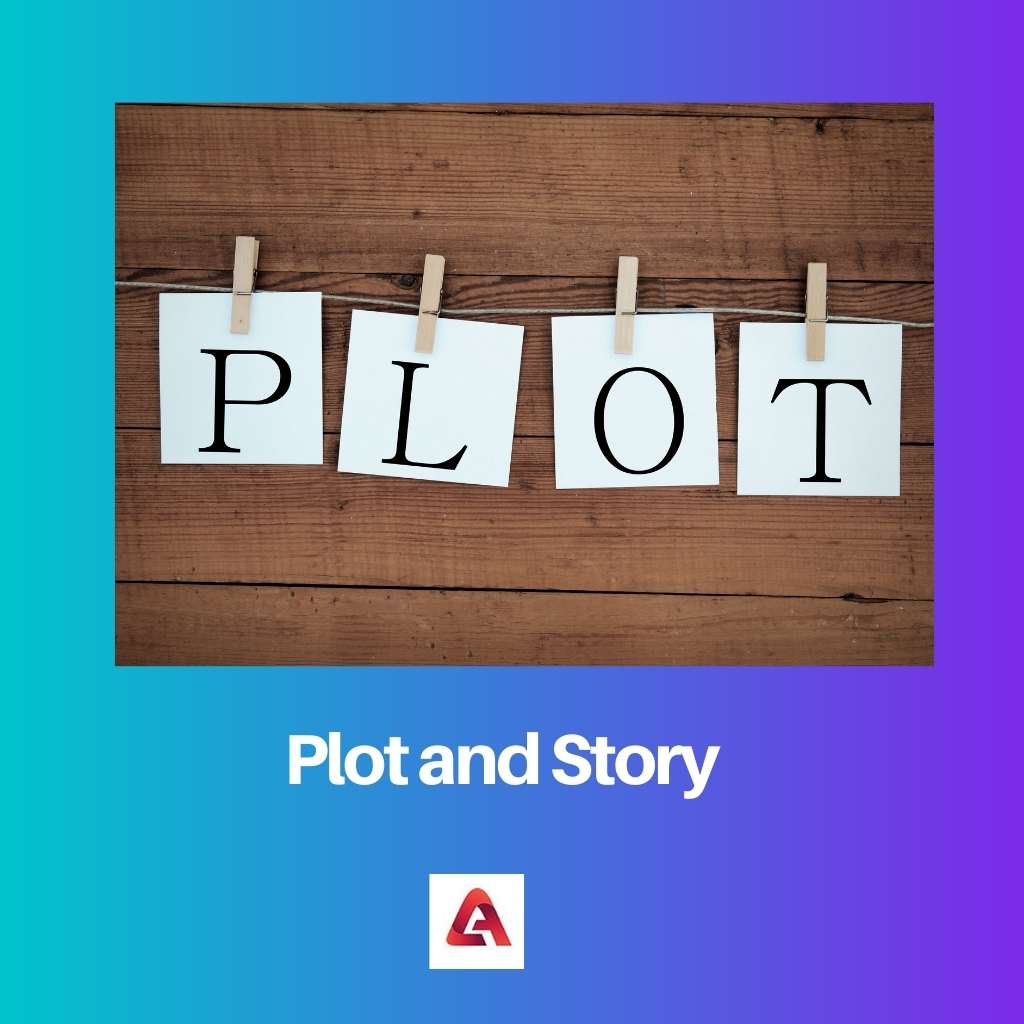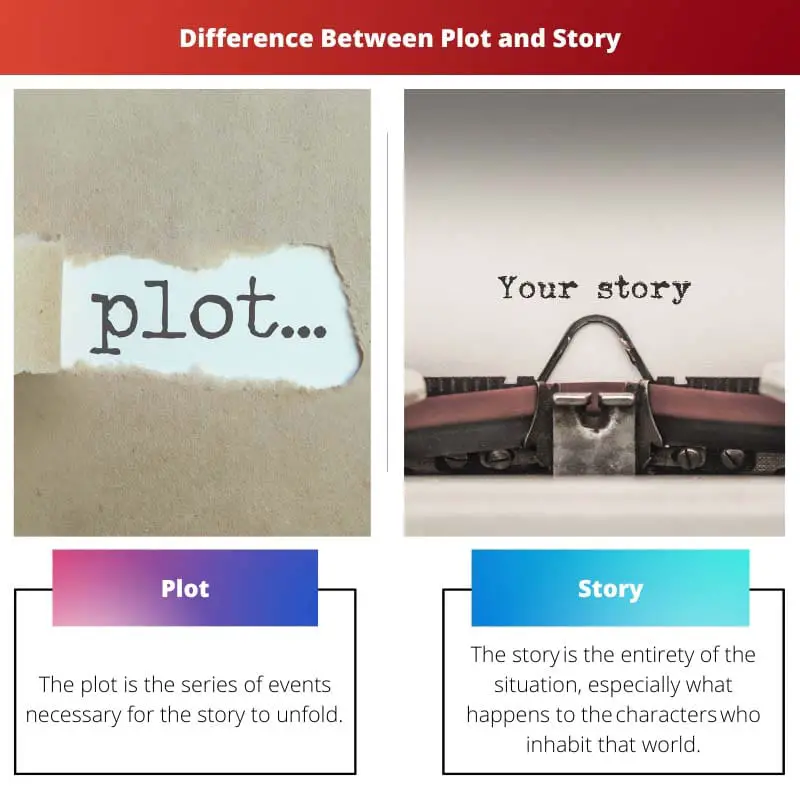Despite the fact that the plot and story are extremely complicated, they each have their own distinct trait. People have a tendency to mix up their meanings at times.
But the most crucial thing to remember is that plot and story are inextricably linked. When purchasing a new novel, the story is summarized in the back of the book, and the plot is the entire content of the book.
Key Takeaways
- A plot refers to a narrative’s sequence of events and actions, driving the story forward and connecting the various elements.
- A story encompasses the broader aspects of a narrative, including characters, themes, settings, and the emotional journey experienced by the characters.
- The plot provides structure and momentum to a narrative, while the story creates a meaningful context and emotional connection for the audience.
Plot and Story
The difference between plot and story is that a plot is a series of events that are considered necessary for the flow of the story, whereas the story is the complete situation consisting of everything, especially what happens to the characters in that particular story.

The plot is a sequence of events that depicts the relationship between them. A plot is required for the story to progress. The plot is made up of numerous parts, such as the inciting incident or conflict, increasing action, climax, declining action, and resolution.
The plot is a set of checkpoints used to drive a story along and keep our attention.
A story depicts the timeline of events. It encompasses the complete circumstance, particularly what happens to the characters who live in that universe.
The story is less thorough and merely gives a broad overview. A story can be told using a series of written or spoken words, as well as still or moving visuals. The emotional engine that fuels our interest is the story.
Comparison Table
| Parameters of Comparison | Plot | Story |
|---|---|---|
| Definition | The plot is the series of events necessary for the story to unfold. | The story is the entirety of the situation, especially what happens to the characters who inhabit that world. |
| Purpose | Expresses relation between events (how it happens) | Expresses timeline of events (what happens) |
| Elements | Set up, inciting incident or conflict, rising action, climax, falling action, and resolution | Setting, characters, plot, and conflict |
| Detailing | The plot is the detailed perspective. | The story is less detailed, much like the general outlook or outcome. |
| Co-relation | Plot development makes a story better. | Story development does not improve the quality of the plot. |
What is Plot?
The plot is the series of events in a literary work, film, or other narratives in which each event has an influence on the next through the principle of cause-and-effect.
A plot’s causal events can be conceived of as a succession of occurrences connected by the “and so” connector. Plots can range from simple (as in a traditional ballad) to intricately interwoven frameworks, each portion of which is sometimes referred to as a subplot.
The plot is made up of tale elements, but the story is the emotional motor that keeps us interested. The plot is just a set of checkpoints used to drive a story forward and keep our attention.
A plot is the exact sequence of events that occur for our characters, as told effectively. True, these frequently overlap with the plot itself. They don’t, however, summarize it.
Some of the most formulaic components of your story structure may be found in the plot. And that isn’t always a negative thing. Because they work, these pieces constitute a “formula.” A protagonist and an inciting event are among the elements. as well as a climax
There’s one more thing worth mentioning. If a plot does not emerge from real-life decisions and consequences, it does not feel genuine. The primary character should not be the focus of the plot. It should happen as a result of their efforts.
What is Story?
A story is any nonfictional or fictional description of a set of related events or experiences. They can be delivered in any mix of written or spoken words, still or moving images, or any combination of these.
It is the fiction-writing technique in which the narrator connects directly with the reader, more tightly defined.
A story is the telling of a factual or fictional event in such a way that the listener experiences or learns something simply by listening to it.
A story is a method of conveying knowledge, experience, attitude, or viewpoint. Every story has a narrator and an audience.
The story is everything: the experience, the emotional backdrop, and the transformations your characters go through as a result of the storyline. In context, the story is considerably larger than a plot summary.
To write a story, you’ll need two things: a significant shift in the characters’ lives (or lives) and a thematic twist that puts the happenings in context.
At some level, both parts are required for a story to work satisfactorily. Without a premise, readers wonder why they read this story in which nothing happens, and we wonder what the point of reading it was.

Main Differences Between Plot and Story
- A plot refers to the series of events, and a story refers to the entire situation, including both events and characters.
- A plot expresses how events occur, and a story expresses what events occur.
- A plot consists of setting, conflict, action, and climax and a story consists of set up, characters, and plot.
- A plot provides a detailed perspective, and a story is less detailed as it provides a general framework.
- A good plot guarantees a good story, but a good story development may not always guarantee a good plot.

References
- https://link.springer.com/chapter/10.1007/978-1-349-13596-7_9
- https://www.degruyter.com/document/doi/10.1515/9783110268669.170/html

The article’s explanation was too complex and unnecessary. The difference between plot and story is apparent enough without the need for such detailed analysis.
The article’s detailed comparison table effectively summarizes the key differences between plot and story, allowing for a clear understanding of their distinctions.
The distinction between plot and story is of paramount importance in understanding the development of a narrative. To write a good storyline, one must know how to differentiate between the two.
The article provides a comprehensive analysis of the differences between the plot and story. It will certainly be beneficial for anyone looking to delve deeper into the art of storytelling.
Absolutely, the article eloquently illustrates the importance of understanding the nuances between plot and story. I found it to be a highly informative piece about the essence of storytelling.
The article’s detailed explanation is paramount in truly understanding the essence of plot and story. It takes an intellectual mind to fully grasp the complexities of storytelling.